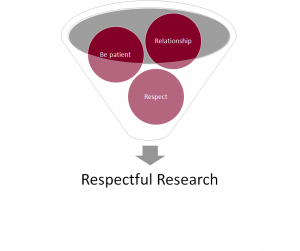There are a variety of Protocols associated with approaching an Elder. Traditionally Elders are offered sacred tobacco when approached with a request. If the Elder accepts your request they will accept your tobacco offering. If the Elder does not feel they can help you, they will often direct you to someone who can. (Wicihitowin Conference Committee, 2017)
“In order to understand the protocols that are being followed, it would be beneficial to spend time with the Traditional Knowledge Keeper(s) that you are seeking assistance from. In fact, it is often viewed as unethical to simply approach a Traditional Knowledge Keeper and expect them to share the knowledge and wisdom you are seeking from them without proper protocol” (Wicihitowin Conference Committee, 2017, p. 10).
Learning from Elders requires time. It is important to develop a relationship with the Elder you wish to learn from. Simply approaching an Elder and asking a direct question may not get you the results you desire.
“It is critical for researchers to listen carefully to what a Traditional Knowledge Keeper is sharing as they may not always provide a straightforward answer to the questions being asked; It may take time to fully comprehend the information that you have been given” (Wicihitowin Conference Committee, 2017, p. 18).
Just because an Elder chooses to share something with you, does not give you the right to share or publish that information.
“Remember, Indigenous peoples believe that knowledge has a spirit within itself; it does not belong to one person or organization, it is to be used to the benefit of all those who need it. Once a project is complete, researchers often feel a sense of entitlement to the information and knowledge that had been developed and captured with the assistance of Indigenous peoples. Attitudes and practices such as this have left many Indigenous peoples, especially Traditional Knowledge Keepers, reluctant to share information and/or knowledge with those who wish to study their people. Therefore, researchers must be willing to see Indigenous peoples and their Traditional Knowledge Keepers as collaborators rather than just participants or research subjects.” (Wicihitowin Conference Committee, 2017, p. 15)

Many components go in to ensure respectful research with Elders and Knowledge Keepers. In general, always start by building relationship. Be patient with the answers you are seeking. Always exhibit respect and a willingness to learn from others. This will set you along your path in a good way, towards respectful research.


